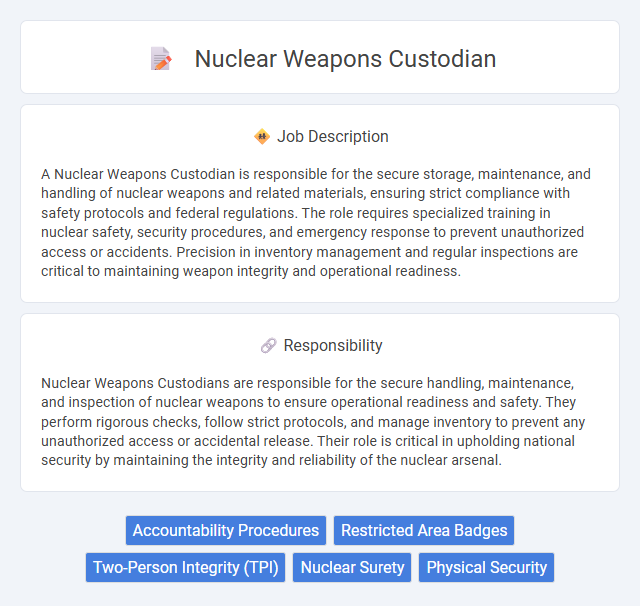
A Nuclear Weapons Custodian is responsible for the secure storage, maintenance, and handling of nuclear weapons and related materials, ensuring strict compliance with safety protocols and federal regulations. The role requires specialized training in nuclear safety, security procedures, and emergency response to prevent unauthorized access or accidents. Precision in inventory management and regular inspections are critical to maintaining weapon integrity and operational readiness.
Individuals suited for the role of Nuclear Weapons Custodian are likely to possess strong attention to detail, unwavering discipline, and the ability to maintain composure under high-pressure conditions. The job may not be suitable for those who struggle with stress management or lack a commitment to strict security protocols. Candidates with a high level of responsibility and reliability probably have a greater chance of thriving in this demanding and sensitive position.
Qualification
A Nuclear Weapons Custodian must possess a high school diploma or equivalent, with specialized training in nuclear weapons handling and security protocols. Candidates typically require clearance eligibility for access to classified information and must complete rigorous physical and psychological evaluations. Proficiency in strict adherence to safety standards, inventory control, and emergency response procedures is essential for maintaining the security and integrity of nuclear arsenals.
Responsibility
Nuclear Weapons Custodians are responsible for the secure handling, maintenance, and inspection of nuclear weapons to ensure operational readiness and safety. They perform rigorous checks, follow strict protocols, and manage inventory to prevent any unauthorized access or accidental release. Their role is critical in upholding national security by maintaining the integrity and reliability of the nuclear arsenal.
Benefit
A Nuclear Weapons Custodian job likely offers significant benefits such as competitive pay, comprehensive healthcare, and retirement plans due to the specialized nature of the role. Probable access to advanced training and career advancement opportunities exists given the critical responsibilities involved. Job security and prestige may also be key benefits for individuals working in this highly sensitive and important field.
Challenge
The role of a Nuclear Weapons Custodian likely involves stringent responsibility for the security and maintenance of highly sensitive armaments, demanding unwavering attention to detail and adherence to strict protocols. Challenges may include managing the psychological pressure of handling potentially catastrophic materials and ensuring compliance with evolving safety regulations. The position probably requires continuous training and the ability to quickly adapt to technological advancements and emergency procedures to mitigate risks effectively.
Career Advancement
A Nuclear Weapons Custodian manages the security, maintenance, and handling of nuclear weapon systems, ensuring strict adherence to safety protocols and regulatory compliance. Career advancement opportunities include roles such as Technical Sergeant, Master Sergeant, and Nuclear Surety Representative, with potential progression into specialized fields like nuclear operations management or security forces leadership. Continuous training, certifications in nuclear surety, and demonstrated expertise in weapon system maintenance significantly enhance promotion prospects and professional development.
Key Terms
Accountability Procedures
Nuclear Weapons Custodians maintain rigorous accountability procedures to ensure the secure tracking and control of nuclear assets at all times. They document inventory, verify serial numbers, and conduct regular audits aligned with Department of Defense regulations to prevent loss or unauthorized access. Accurate recordkeeping and strict adherence to chain-of-custody protocols are critical components in safeguarding national security and maintaining operational readiness.
Restricted Area Badges
The Nuclear Weapons Custodian is responsible for managing and safeguarding restricted area badges that grant access to secure nuclear facilities. These badges are critical for maintaining controlled entry and ensuring only authorized personnel access sensitive nuclear weapons zones. Proper issuance, tracking, and accountability of restricted area badges directly support the security protocols mandated by nuclear regulatory authorities.
Two-Person Integrity (TPI)
The Nuclear Weapons Custodian is responsible for maintaining Two-Person Integrity (TPI) protocols to ensure the highest level of security and safety when handling nuclear warheads, requiring the presence of two authorized personnel at all times during critical operations. This procedure prevents unauthorized access, reduces human error, and enforces accountability by mandating simultaneous verification and monitoring. Adherence to TPI standards is essential for compliance with Department of Defense regulations and nuclear surety policies.
Nuclear Surety
Nuclear Weapons Custodians play a critical role in maintaining Nuclear Surety by ensuring the security, safety, and reliability of nuclear weapons. They conduct rigorous inspections, control access, and follow strict protocols to prevent unauthorized use or accidental detonation. Their expertise supports compliance with Department of Defense and Nuclear Regulatory Commission standards for nuclear weapon storage and handling.
Physical Security
The Nuclear Weapons Custodian is responsible for implementing stringent physical security measures to safeguard nuclear arsenals against unauthorized access or theft. This role involves maintaining secure storage facilities, conducting regular security inspections, and ensuring compliance with Department of Defense regulations and security protocols. Effective physical security management by custodians is critical to national security, preventing potential threats associated with nuclear weapons.
 kuljobs.com
kuljobs.com